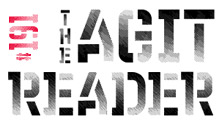
Don’t You Forget About Me
by Jennifer Farmer
Islands, as the band’s singular domain name, as well as longtime followers, suggest, are forever, yet nothing can genuinely last an eternity without constant evolution, a fact that frontman Nick Thorburn and company know quite well. Islands, which sprung forth from the ashes of the now-defunct, creatively chaotic and universally beloved Unicorns, earned notoriety as a rambunctious sextet that created a cornucopia of shiny pop melodies laced with dancehall beats. Nearly six years later, however, Islands has matured considerably, both literally while enduring several line-up changes, and emotionally, due in no small part to incidents masked as life’s typical twists and turns. In Thorburn’s case, one of these twists included a break-up with a longtime girlfriend. So, in a rare move for a relative recluse, he took to music to extricate those negative emotions. The result is A Sleep & A Forgetting, an album with a beautifully minimalistic sound that marries perfectly with the album’s subject matter and showcases Thorburn’s newly keen sense of emotional vulnerability, and subsequently, control.
I got in touch via email with Thorburn, who took the time to answer a few questions.
Where did the title A Sleep & A Forgetting come from, and how does it fit with the vibe of the album?
Nick Thorburn: I first noticed it as the title of a Melville House publication of a 100-year-old William Dean Howells novella. It was staring back at me in a bookstore, and I knew immediately that it was the title of the album. It is also a line in a William Wordsworth poem. I hijacked the line and more or less appropriated the meaning to fit in with the sleepy sensation of overcoming emotional tumult.
What was the significance of the Valentine’s Day release and could you explain some of the background behind that decision?
NT: Primarily, it was a coincidence. We started recording on Valentine’s Day and that was about 80% timing and 20% irony. We could have started on the 13th or the 15th, but it seemed funny to begin on the 14th. As for the release, records come out on Tuesdays, and Valentine’s Day landed on a Tuesday. Cased closed, pretty much.
The lyrics are very contemplative and subjective, as opposed to the objective storytelling on previous Islands albums. What was different about the writing process this time around?
NT: I had to push myself to be as vulnerable and personal as possible, and at times it was a real uphill battle. I still cradle my feelings in familiar motifs, be they nautical or grisly and death-obsessed.
How did you manage to stay focused during all the line-up changes and various side projects, especially playing with Mister Heavenly, which got a lot of publicity?
NT: Islands may continue to change, though I hope it remains constant, as I’m very content with the current iteration. Everything comes back to the songs, though, and that’s the only thing that really demands and deserves my focus and attention. Everything else is a distraction.
Line-up changes aside, how, in your opinion, has Islands’ collective sound evolved since Return to the Sea?
NT: I like to think I’ve gotten better at writing songs. I’m approaching record-making like a dustbuster. I’ll keep collecting all the detritus that goes into making records, and hopefully by the end, I’ll have a bag full of really dirty crud. Bad metaphor.
You’ve always been one to sort of distance yourself personally from the audience in the past, taking a stage name (Diamonds), face paint, etc. So why the proverbial “baring of the soul” now and are you nervous about peoples’ reactions?
NT: Extremely nervous and incredibly embarrassed (look out Safran Foer). I’m trying it out. This soul-baring honesty is my new face paint.
Can you explain a little bit about the recording process of this album? It’s definitively rawer and more barebones than the others.
NT: The record was tracked live as a band, instrumentally, with very few punches and minimal overdubs. A song like “Oh Maria,” for example, was recorded live, but with vocals as well, all in one take. That was terrifying and is something very few people do these days. For the other songs, I would go in and record the vocals later so that they could have my full attention, as they are generally the first thing people hear.
How did music influence you growing up? What kind of music were you into as a teenager?
NT: Music was a huge part of my life, from the music my parents would play on long drives as a young kid (Fleetwood Mac, Paul Simon), to the music I would steal from my older sister as a pre-teen (The Cure, Stone Roses, Pixies, Catherine Wheel). Also, my few peers in high school played in bands, and that was really my entry point and transition from a listener to a participant. We would listen to bands like Crass, Dead Kennedys, Propaghandi and The Clash. I also had a big thing for Bauhaus, Skinny Puppy, Fugazi, Jane’s Addiction, Morrissey, James, Ween, Psychic TV, and The Flaming Lips. I was alone in most of those musical choices.
Lastly, what is your ex-girlfriend going to think of the album?
NT: I’d rather not talk about that. It’s off the record. Or on the record only, if you get my drift.
